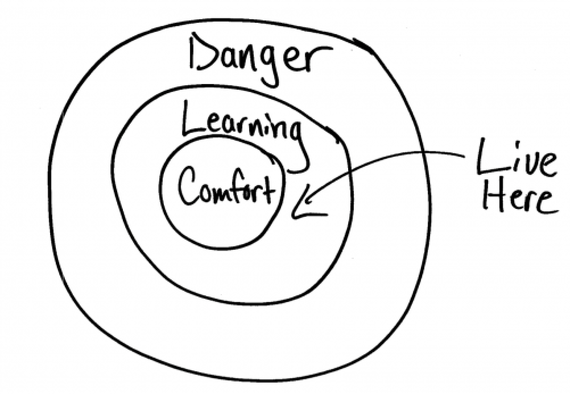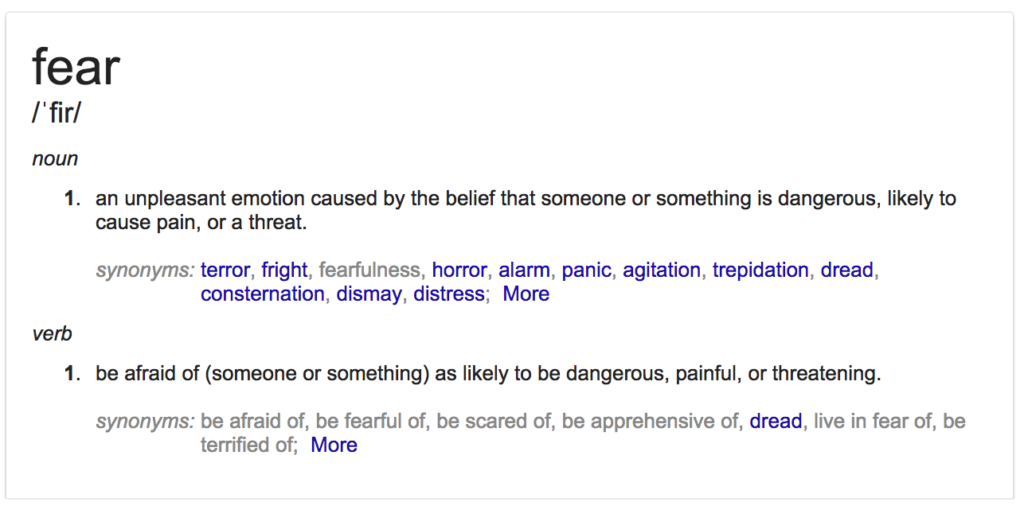Doug and Pete’s Technological Listing of 10 Things to Fear 5

Comfort Zone, credited to Barrett Brooks
What Do Educators Fear About Using Technology?
Doug Peterson (@dougpete, on Twitter) and Peter McAsh (@pmcash, on Twitter) sat down to brainstorm a response to the original Colleen Rose’ post What Do Educators Fear About Using Technology?, and Doug posted 10 Things to Fear this morning. As I read through their list, I found myself mentally generating possible responses to their compilation, and found myself drawn to reply:
First, let’s look at fear:

Definition: Fear, as returned via Google, edited
Perception, Attitude, Behaviour and Learning Outside our Comfort Zone
Year’s ago, I learned that our behaviours are influenced by our attitudes, and that our attitudes are influenced by our perceptions. Fear is perceived — we need to start with our perceptions of technology and our come to grips with our attitudes towards it so that we can modify our behaviours as we address its role in supporting learning.
Moving from fear towards comfort requires moving through a zone of discomfort. I did a quick search for a header graphic and selected the one seen above (Comfort Zone, credited to Barrett Brooks (@BarrattABrooks, on Twitter) via a How your Comfort Zone is Sabotaging your Success on Huffington Post.) You may be interested in seeing the results of my simple search and choose a variant that works for you.
I will confess up front that there are times when I find it difficult to encounter fear with technology. And as a result, I found myself coming up with some rather flip responses to some of the entries on Doug and Peter’s list — there are no doubt some real challenges expressed there. But I also found that a good number of the entries on Doug and Peter’s list would be what we might term as “heard rationalizations,” — things that we have heard people say over the years, rather than true rationales against using technology. Rationalizations help you argue against something with yourself. Instead we need to cultivate with our learners a “find a way” mindset towards finding solutions. So watch for a few short comebacks embedded within the following. But in general, I’ve also tried to provide a start at a valid set of possible supports.
Developing a comfort with discomfort is a great way to start.
My responses to 10 Things to Fear.
- “The kids know more than I do!”
- In life, everyone knows different things. Learn to learn from one another.
- Ask yourself, “When did you stop learning? Why did you stop learning?” “What do you think you need to learn more about?”
- “I don’t have time; so many other things that are more important.”
- What is more important than learning?
- Re-assess priorities from time to time. Think critically about what you are doing and whether it still fits. Maybe there is a newer, better way?
- Buddha says, “Your purpose in life is to find your purpose in life.”
- “How do I know that it fits the curriculum?”
- What a great question! Ontario’s Language curriculum is dated 2006, which is before Twitter existed. The “leader of the free world” exerts considerable influence through his “writing” via the technology of Twitter. We always need to assess the relevancy of the curriculum.
- “My school doesn’t have enough computers for every student to have their own.”
- Get more.
- BYOD
- Have your students share. Re-organize lessons to use groups or centres. (There are days when I still struggle with this. But it works.)
- “I need a workshop on this.”
- Find a friend to learn with.
- Search YouTube for a video.
- Join an open, online course.
- Worst case, go find a workshop on this. But seriously, we don’t need workshops on everything; We need to change our beliefs and then our behaviours about how we learn. In this day and age, waiting for a workshop is an excuse.
- “Nothing worse than booking the lab, taking the entire class there, and then half the computers are broken.”
- Yeah, that is a bummer. Been there. As I learner, I would be ticked off. I’m sure the principal, the superintendent, the trustees (and the parents of your students!) don’t want half the computers to be broken. This is a school issue, and there are folks who can help you to get it addressed.
- In the meantime, have the kids work with a partner.
- “It’s not in the curriculum.”
- See “How do I know that it fits the curriculum?” above.
- “Coding” is only minimally reflected in Ontario’s K-12 curriculum. Ontario currently faces a shortage of programmers on the order of tens of thousands per year. The Ontario Ministry of Education knows this. But so do a lot of teachers. A lot of teachers are making space for coding, rather than waiting for “a curriculum.”
- Too much curriculum; not enough time to experiment.”
- Time is a real constraint, no doubt about it. What is important?
- With time, you can learn to make time. Again, learning is an investment. Careful investing requires making careful choices.
- “I’m not sure I have a login on the school network. Who do I ask?”
- Ask a colleague at your school.
- Ask your office administrator.
- Ask your best teacher friend who teaches at a different school.
- Ask your principal.
- Check for a “help desk” on your district’s web site.
- Email someone on the OSAPAC committee.
- Follow up with that person you met at that conference you went to a year ago with whom you exchanged emails after you had that discussion about that thing.
- “I have a Mac at home and the school has Windows.”
- Excellent! You can do a lot great stuff with a Mac!
- 95% of what you need is web-based, and the web is cross-platform. Your school is good to go, as long as you have good Internet.
- “The IT Department has the computers locked down and I can’t run the software I need.”
- 95% of what you need is web-based, and the web is cross-platform. Your school is good to go, as long as you have good Internet. Is there an echo?
- “What if the kids get into a porn site?”
- Responsible IT departments have this covered for you.
- Relax. Most kids are immediately horrified whenever something even remotely “inappropriate” shows up on a screen at school.
- “I can teach the topic better without technology.”
- Can the students LEARN the topic better WITH technology? If so, use the methods that best support their learning. It’s not about technology OR your teaching, it’s about their learning.
- Technology is not the answer to everything, and not everything is best learned via technology. Us it when it makes a difference.
- “I’m a Google person trapped in a Microsoft world or vice versa.”
- Ouch. Yeah. Or a Mac person trapped in a Microsoft world.
- Either make friends with what you are given, advocate for alternatives, or find ways to transfer the necessary skills to your board’s chosen platform.
- Be happy, in the olden days, folks worried about whether they had WordPerfect or MS-Office, and honestly, it’s what you write that is important, not the program you write it in. But yeah.
- “Our computers are too old and not powerful enough.”
- They must be good for writing.
- What is the replacement cycle at your school/board? If they are that old, you are just about to get an upgrade!!!!
- “I’m concerned about student privacy.”
- Being cautious about student privacy is a good thing. It’s not an excuse to do nothing.
- Use your concern about student privacy to learn and educate your learners.
- “I’m concerned about my own privacy.”
- Being cautious about your own privacy is a good thing. It’s not an excuse to do nothing.
- Use your concern about privacy to learn and educate yourself. Again, find a friend to learn with.
- “Somebody needs to be the champion of cursive.”
- I discovered one day (not too many years ago) that it is important to know cursive so that you can read cursive.
- I discovered one day (not too many years ago, but the same day as I discovered the item above) that very little of what we encounter in schools today is written in cursive.
- I also learned that using cursive as an educator exacerbates the learning challenges for my identified students, and that printing fits a UDL model. My printing has always been easier to read than my cursive.
- Voice-to-text is a marvellous technology. For everybody.
- Slowing down the brain by writing by hand still has a place in helping one to think.
- “Nobody has ever hacked my filing cabinet.
- Probably true. But are you sure?”
- Nobody is likely to hack your computer for your lesson plans either. Worry more about your PIN and your bank card.
- “The printer never works – I have to print their work so I can mark it.”
- No you don’t. (I really only ever had this as a need once.)
- Learn to print to PDF. CutePDF is one of many answers if one doesn’t already exist at your school.
- “What if the technology isn’t charged and goes dead in class?”
- Been there. It’s a lesson in learning to be prepared, and one that your learners need to learn to deal with themselves.
- Do you have a car charger for your phone? Why?
- Be that person at a conference who totes around a power bar or extra phone battery. You can make friends that way. (‘Truth!)
- “I tried once and failed badly. Once burned, twice shy.”
- There is a story floating around about Thomas Edison and the light bulb. The number 10, 000 comes up in it. He probably got burned at least once.
- There is an acronym floating around: FAIL: First Attempt at Learning.
- “Phones are banned in my school.”
- Do you need phones? What question are “phones” providing the answer for? Is there another answer?
- My P/J students don’t have phones. Getting phones isn’t an answer to their needs.
- Why are phones banned? Who do you need to convince? (Answer: You only need to convince yourself to get started on this path …)
- Are phones banned for teachers and administrators, too? Is this hypocrisy?
- “The bulb in my data projector is burned out and my principal won’t replace it.”
- Yeah. Data projector bulbs are pricey, no doubt.
- Why won’t your principal replace it? Is the issue financial/budgetary, or is it philosophical?
- Back in the day, I arrived at a new school one September and we had ONE overhead projector for the whole school. We were promised we would have new overhead projectors for all for the following September. Back then, I decided that rather than have my practice and my classroom be disadvantaged for a whole year, I would buy one myself. A couple years later, I lobbied my principal for a SMART board, and the overhead projector became redundant. How important is a particular piece of technology to your teaching and learning practice?
- “Nobody else does, why should I?”
- Do you believe that “it” is important?
- Somebody needs to be first. Why not you?
- Somebody needs to be second. Why not you?
- The person who goes first needs a friend, and the person who goes second can be that friend. You and a friend can share the honours and support one another.
- “What do I do when something goes wrong?”
- Excellent question! What DO you do when something goes wrong?
- Learn to develop the comfort requried to answer the question, “What do you do when something goes wrong?”
- “I don’t want to show a weakness in my knowledge in front of the class.”
- Knowledge Doubling Every 12 Months, Soon to be Every 12 Hours
- Nobody expects you to know everything. You may be an expert in one or several fields, and in those areas you are likely well ahead of your learners. But our understanding of the world is continually evolving, and you probably know that.
- You probably already know that kids like to connect with the real you. Encourage a two way dialogue about learning. What can you learn from them?
- “I’ve never had a Scratch workshop; maybe my school could hire somebody.”
- Maybe your school COULD hire somebody!
- You can learn Scratch online. It’s free! It’s by MIT. Learn Scratch in 10 Minutes
- You can buy a book about Scratch at Chapters/Indigo. They will even deliver!
- “What if a student puts 2 spaces after a period?”
- As a learner and as a educator I put two spaces after a period for decades and the world never ended. It was the convention then. Nobody complained. Then one day I read an article about how the convention was changing (print publishers needed to save money and someone had calculated the real savings) and so I simply taught myself to tap the spacebar once instead of twice after a period. Today, I only worry about having an accidental double-space between words in my report card comments, because THAT is the one real no-no where it matters.
- “What if their essay or report includes emoji?”
- Do you include emoji in your emails and texts? 😉 I’m partial to the winky-face, because there is a lot to wink about in learning. You can even say “smiley face” or “winky face” to Siri and she will put it in your paragraph or text for you!
- Consider audience, context, and format. Emoji are a new addition to our text-based communication, originally a work-around on the limits of the keyboard as a way to include emotion. Maybe you can work with the learner on tone, voice, and the use of irony and hyperbole as new techniques in communicating on multiple levels?
- Remember that primary students are taught to self-assess their work using smiley faces before they learn to couch their emotions in words. Words are just a different symbolic representation.
- “Many of the resources have US content. What about Canadian resources?”
- US English. UK English. Put a U in colour, honour, neighbourhood. Can you get a little Canadian Flag to show in the menubar instead of the US one?
- “It’s the librarian’s job.”
- Lucky you! You have a librarian.
- “How do I mark it?”
- Ask the Ministry of Education. (Sorry, that’s an old joke.)
- “If my board or school thought it was important, they would do workshops and train me.”
- Breaking News: Boards and Schools don’t have a monopoly on deciding what is important.
- Breaking News: Board and Schools don’t have the time and resources to do workshops and train you on everything you need/want to know.
- OTF, OSSTF, ETFO, AEFO, OECTA, and TVO all offer workshops for teachers. So do our professional subject associations.
- Search out an #edCamp near you!
- “Two words – Fake News”
- Making up fake news is fun!
I think I got a bit punchy towards the end. Maybe Doug and Peter were scraping the bottom of their barrel by that point, too.
Help to Make Peace with Technology in Learning
For anyone who might like to add to this — especially with concrete responses to the real challenges, feel free to ask for access to edit the shared document that I’ve made available to Doug, Peter, and Colleen.
Again, learn to develop a comfort with discomfort!
If you are a member of the Educational Computing Organization of Ontario (ECOO), look to bring a colleague or three to the annual Ontario education technology conference, Bring IT, Together #BIT17, November 8-10th in Niagara Falls, Ontario.
If you are NOT a member of the Educational Computing Organization of Ontario (ECOO), you automatically become a member by attending our annual Ontario education technology conference, Bring IT, Together #BIT17 November 8-10th in Niagara Falls, Ontario. So come, and bring a colleague or three with you and learn together!
There is nothing to fear, technology-using educators are a friendly bunch!



